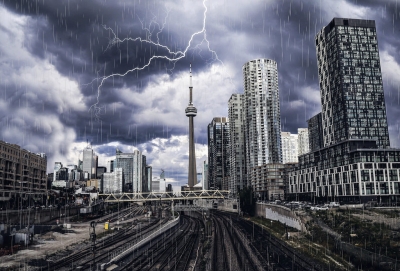LTL Blog
Lineman's Testing Laboratories of Canada
Ensuring Electrical Sa...
Ensuring the Integrity...
Tips for safety when w...
7 Benefits to Using Gr...

Fall is a rowdy season, known for its wild temperature swings and powerful fall storms that could result in hazards such as downed powerlines or power outages. Working at heights also becomes dangerous when winds pickup quickly or temperatures drop suddenly. That’s why it’s important to be familiar with the precautions one should take when dealing with any of the following hazards:
Downed Power Lines
You cannot tell whether or not a power line is energized just by looking at it. You should assume that all downed power lines are live which could cause serious injury or even death. Your body is a conductor of electricity so never touch or move a power line. Don’t walk under it or step over it. Simply move away from it as the ground around it - up to 35 feet away - could be energized. Call 911 for help.
Proper way to move away from a power line: shuffle away with small steps, keeping your feet together and on the ground at all times as this will minimize the potential for a strong electric shock.
Floods
Flooded areas are becoming a growing concern in the fall and winter seasons. Submerged outlets and electrical cords could easily energize the water during floods which means it’s dangerous for anyone to be stepping into the water. Stay away from areas submerged in water and make sure not to use any electrical appliances that are touching the water. Call for help and wait until the area has been checked by a professional.
Water-Damaged Electrical Equipment
Inspect any electrical equipment that has gotten wet during a storm before using it. Flood waters usually carry contaminants that can damage wiring, so it’s likely that the equipment you have won’t operate properly. Have them replaced.
Power Generators
Power Generators could cause electrical issues in the event of a storm. It is important that proper measures are taken prior to any storm to ensure the generator is properly grounded. Don’t connect the generator directly to household wiring as this can back feed along power lines and can cause harm to anyone who comes in contact with it.
Severe weather events can be dangerous and why it is necessary to be prepared. Always plan ahead to reduce the risk of electrical shock, and if you are pre-warned of a potential disaster, turn off all your appliances, disconnect sockets, and switch off breakers. Doing so will keep you and everyone else safe.
Winds
Severe weather patterns could increase wind speeds by 5, 10, 15 or more MPH. If working at heights, it is important to use the right fall protection equipment to ensure you are safe at all times. For workers on the ground, it might be easy to evacuate or take shelter, but it won’t be easy for someone at a height.
Contact your local LTL Product Specialist to learn more about how we can help protect you with our inventoy of safety products and emergency equipment, including PPE, fall protection, temporary power solutions (including generators), as well as best practice and legislated requirement for poperly maintaining PPE to ensure equipment integrity.
Your comment will go through an approval process and may not be visible to the public right away.


